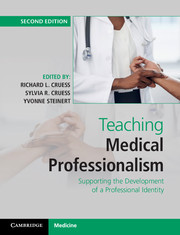Book contents
- Frontmatter
- Contents
- List of contributors
- Foreword
- Introduction
- Part I What is to be taught and learned
- Part II Theory
- Part III Principles
- Part IV Case studies in promoting professionalism and professional identity formation across the continuum
- 15 The evolution of an undergraduate medical program on professionalism and identity formation
- 16 Developing and implementing an undergraduate curriculum
- 17 Supporting professionalism and professional identity formation at the postgraduate level
- 18 Changing the educational environment to better support professionalism and professional identity formation
- Part V The future
- Index
- References
18 - Changing the educational environment to better support professionalism and professional identity formation
from Part IV - Case studies in promoting professionalism and professional identity formation across the continuum
Published online by Cambridge University Press: 05 April 2016
- Frontmatter
- Contents
- List of contributors
- Foreword
- Introduction
- Part I What is to be taught and learned
- Part II Theory
- Part III Principles
- Part IV Case studies in promoting professionalism and professional identity formation across the continuum
- 15 The evolution of an undergraduate medical program on professionalism and identity formation
- 16 Developing and implementing an undergraduate curriculum
- 17 Supporting professionalism and professional identity formation at the postgraduate level
- 18 Changing the educational environment to better support professionalism and professional identity formation
- Part V The future
- Index
- References
Summary
Increasing attention to the impact of the hidden curriculum on the formation of professional identity has spurred medical schools to focus on the professional behaviors of faculty and the healthcare team. However, medical schools are complex organizations, and so are the health systems with which they partner to train the next generation of physicians. Beyond achieving short-term improvements in specific areas, can a medical school actually change its culture to promote the development of professionalism? In 2000, undaunted by the potential challenges, leaders at Indiana University School of Medicine (IUSM) launched a set of initiatives to explicitly incorporate professionalism into the culture of the school. After providing a synopsis of the approach used to achieve culture change at IUSM, we describe the initiatives subsequently undertaken between 2008 and 2015 to improve the learning climate and support the formation of professionalism in IUSM's learners at a departmental level.
Changing the culture of a medical school
As described in published reports by the Dean and other leaders at IUSM, there was no one event that ignited the desire to implement a change. Rather, there was growing awareness that graduating students were less satisfied than national norms, felt their learning climate to be more adverse than students from other schools, and hesitated to bring their concerns forward because they felt it unsafe and believed that nothing would be done to improve the situation. The Dean was also concerned that a new focus on the business of medicine would detract from the core values of the profession.
The key elements of the culture change at IUSM included affirmation of core organizational values, implementation of appreciative and relational strategies as part of a relationship-centered care initiative (RCCI), revisions in admissions criteria, and alignment of compensation incentives with important qualitative aspects of faculty performance.
The organizational change process at the medical school started with a small but meaningful narrative exercise based on appreciative inquiry and reflection. A “Discovery Team” was recruited to collect and analyze the stories shared at appreciative interviews, with eighty stakeholders describing examples of when the organizational culture of the school exemplified the standards of professionalism desired in the school's medical students. The themes and stories were subsequently shared at an open forum, after which a steering committee identified a cascade of additional change opportunities.
- Type
- Chapter
- Information
- Teaching Medical ProfessionalismSupporting the Development of a Professional Identity, pp. 261 - 276Publisher: Cambridge University PressPrint publication year: 2016

